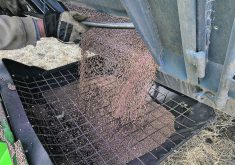When RCMP respond to a complaint of crime in a rural area, the suspects are usually long gone by the time the police arrive.
So if property owners happen across a robbery in progress in a rural area, what should they do while waiting for police to arrive?
Glen Jacques, senior crown prosecutor in North Battleford, Sask., said police generally prefer that property owners wait for officers to deal with the situation.
However, if there is a continued property offence, Section 494 of the Criminal Code of Canada allows for a citizen’s arrest.
Read Also

Agritechnica Day 2: The future of tractor power, building quicker crop apps and large farms and tech
Agritechnica Day 2: The future of tractor power, building quicker crop apps with Syngenta and large farms and tech
“It states that a property owner who is witnessing a criminal offence can attempt to effect a citizen’s arrest and turn the apprehended perpetrator over to a police officer as soon as practical, or forthwith,” Jacques said during a presentation at Agri-Vision in Lloydminster.
Related stories:
- New technology protects property by tracking it
- Rural landowners walk fine line when defending their property
- Manitoba, Saskatchewan see increase in crime
He said it sounds simple, but the devil is in the details because most individuals engaged in criminal activities are not going to stop when approached by somebody and told they’re under citizen’s arrest.
A property owner is allowed to attempt to use force to apprehend someone who he’s advised is under citizen’s arrest and is refusing to comply. But the property owner has to be careful on a practical and a legal level.
On a practical level, things can go wrong quickly and property owners and their family members risk injury when trying to conduct a citizen’s arrest.
On a legal level, “the law requires property owners only use the minimum of force that is required, and if the incident goes sideways not only is there potential for physical dangers, there is also potential, under police investigation,(and) the property owner may end up facing a criminal charge and/or a civil lawsuit,” Jacques said.
He said even though a citizen’s arrest exists in law, people must be very discrete and careful in attempting it.
The Criminal Code of Canada under Section 247 outlaws a property owner setting or placing a trap, device or other thing that is likely to cause death or bodily harm to a person.
“If you set a trap that could potentially injure someone, or even kill them in the furthest extreme, that property owner would end up likely to be charged by police because that is not allowed under the criminal code,” Jacques said.
Guard dogs are a good crime deterrent, but property owners must weigh the benefits and risks involved with having them.
“(Guard dogs) kind of fall into a grey area because a property owner is responsible for the guard dog and if it chews up somebody who is lost or is coming for medical aid, the property owner would have to face the consequences,” Jacques said.
















